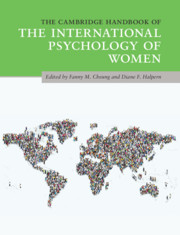Book contents
- The Cambridge Handbook of the International Psychology of Women
- The Cambridge Handbook of the International Psychology of Women
- Copyright page
- Dedication
- Contents
- Figures
- Tables
- Contributors
- Acknowledgments
- Section 1 The Underpinnings of Sex and Gender and How to Study Them
- Section 2 Developmental Perspectives of the International Psychology of Women
- Section 3 Cognitive and Social Factors
- 10 Sex, Gender, and Intelligence
- 11 At the Crossroads of Women’s Experience
- 12 Gender and Personality Research in Psychology
- 13 Selfhood and Self-Construal
- 14 Cultural Influences on Body Image and Body Esteem
- 15 The Not So Subtle and Status Quo Maintaining Nature of Everyday Sexism
- 16 A Gendered Light on Empathy, Prosocial Behavior, and Forgiveness
- 17 The Impact of Gender and Culture in Consumer Behavior
- 18 Evolutionary Roots of Women’s Aggression
- Section 4 Work and Family Issues
- Section 5 Inequality and Social Justice
- Section 6 Health and Well-Being
- Epilogue Some Final Thoughts and Take-Home Messages
- Index
- References
16 - A Gendered Light on Empathy, Prosocial Behavior, and Forgiveness
from Section 3 - Cognitive and Social Factors
Published online by Cambridge University Press: 20 July 2020
- The Cambridge Handbook of the International Psychology of Women
- The Cambridge Handbook of the International Psychology of Women
- Copyright page
- Dedication
- Contents
- Figures
- Tables
- Contributors
- Acknowledgments
- Section 1 The Underpinnings of Sex and Gender and How to Study Them
- Section 2 Developmental Perspectives of the International Psychology of Women
- Section 3 Cognitive and Social Factors
- 10 Sex, Gender, and Intelligence
- 11 At the Crossroads of Women’s Experience
- 12 Gender and Personality Research in Psychology
- 13 Selfhood and Self-Construal
- 14 Cultural Influences on Body Image and Body Esteem
- 15 The Not So Subtle and Status Quo Maintaining Nature of Everyday Sexism
- 16 A Gendered Light on Empathy, Prosocial Behavior, and Forgiveness
- 17 The Impact of Gender and Culture in Consumer Behavior
- 18 Evolutionary Roots of Women’s Aggression
- Section 4 Work and Family Issues
- Section 5 Inequality and Social Justice
- Section 6 Health and Well-Being
- Epilogue Some Final Thoughts and Take-Home Messages
- Index
- References
Summary
We discuss the role of gender in the empathic processes involved in prosocial behavior and the resolution of interpersonal and intergroup conflict. After defining empathy and addressing several theoretical issues, we discuss Gilligan's Ethic of Care, assessments of empathy and their relation to prosocial behavior, and gender and forgiveness in children's and adults' interpersonal relations. Finally, we discuss empathy in the resolution of intergroup and social conflicts, highlighting women's role conflict resolution.We conclude that girls and females evidence more empathy across a wide variety of measures, including behavioral measures, and that gender differences in empathic processes have a major impact on how women and men resolve moral dilemmas, how they behave in prosocial contexts, and how they react to and resolve interpersonal and intergroup conflict.
- Type
- Chapter
- Information
- The Cambridge Handbook of the International Psychology of Women , pp. 221 - 243Publisher: Cambridge University PressPrint publication year: 2020
References
Suggested Readings

Rachel Karniol is Professor of Social Development in the School of Psychological Sciences at Tel Aviv University. She was born in Israel to Holocaust survivors from Hungary and Transylvania. Hungarian was her first language, Hebrew was her second language, and English became her third language after arriving in Canada in 6th grade. After completing her PhD at the University of Waterloo, Canada, she taught at the University of Toronto. During sabbaticals she also taught at Princeton University, Carnegie Mellon University, Tufts University, and University of Florida. Her expertise is at the crossroads of social and developmental psychology, with a focus on the process of understanding other people, empathy, moral development, and gender. Her research has appeared in Psychological Review, Psychological Bulletin, Annual Review of Psychology, Developmental Review, and Journal of Personality and Social Psychology. Her book Social development as preference management: How infants, children, and parents get what they want from each other was published by Cambridge University Press (2010). Karniol’s husband, who was a Professor of Aerospace Engineering at the Technion in Haifa, Israel, is also the child of Holocaust survivors and was born in Poland. They raised their two children as Hebrew–English bilingual.

Sabina Čehajić-Clancy is an Associate Professor of Social and Political Psychology at the Sarajevo School of Science and Technology. She holds a PhD in Social Psychology from Sussex University and is affiliated with Stanford University as a former Fulbright Scholar. Čehajić-Clancy is an expert in the area of intergroup reconciliation, for which she has received many dissertation and career awards. Her research integrates theories on intergroup relations, emotion regulation, and moral disengagement, combining the experimental lab studies with field experiments. She has published articles in Psychological Inquiry, Journal of Personality and Social Psychology, Group Processes & Intergroup Relations, and Political Psychology, two books, and numerous contributions to edited volumes or encyclopedias. She also serves on editorial boards for Political Psychology and the European Journal of Social Psychology. Her research has been funded by prestigious research councils, among them the Economic and Social Research Council and the British Academy. In addition to her research excellence, she has over fifteen years of experience in working as a consultant for USAID, UN agencies, and other more grassroots-based NGOs in the area of education, peace building, and reconciliation. Her work has also received wide national and international coverage. Website: cehajicsabina.wixsite.com/clancy

